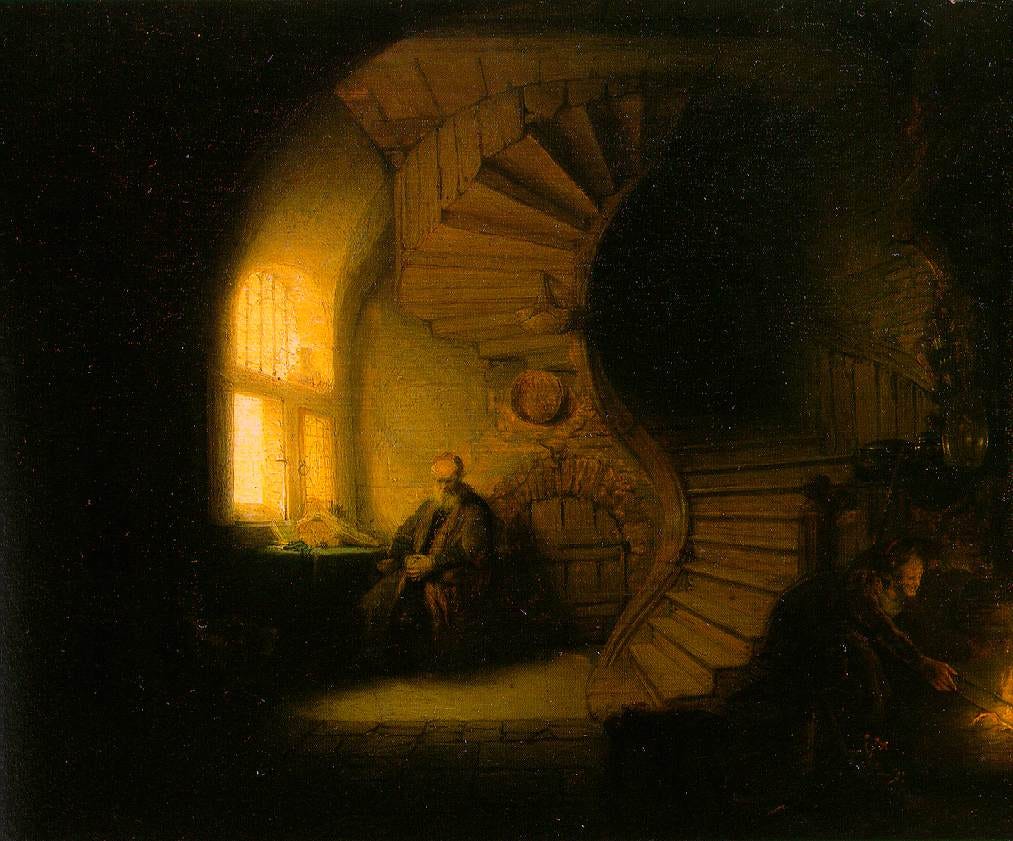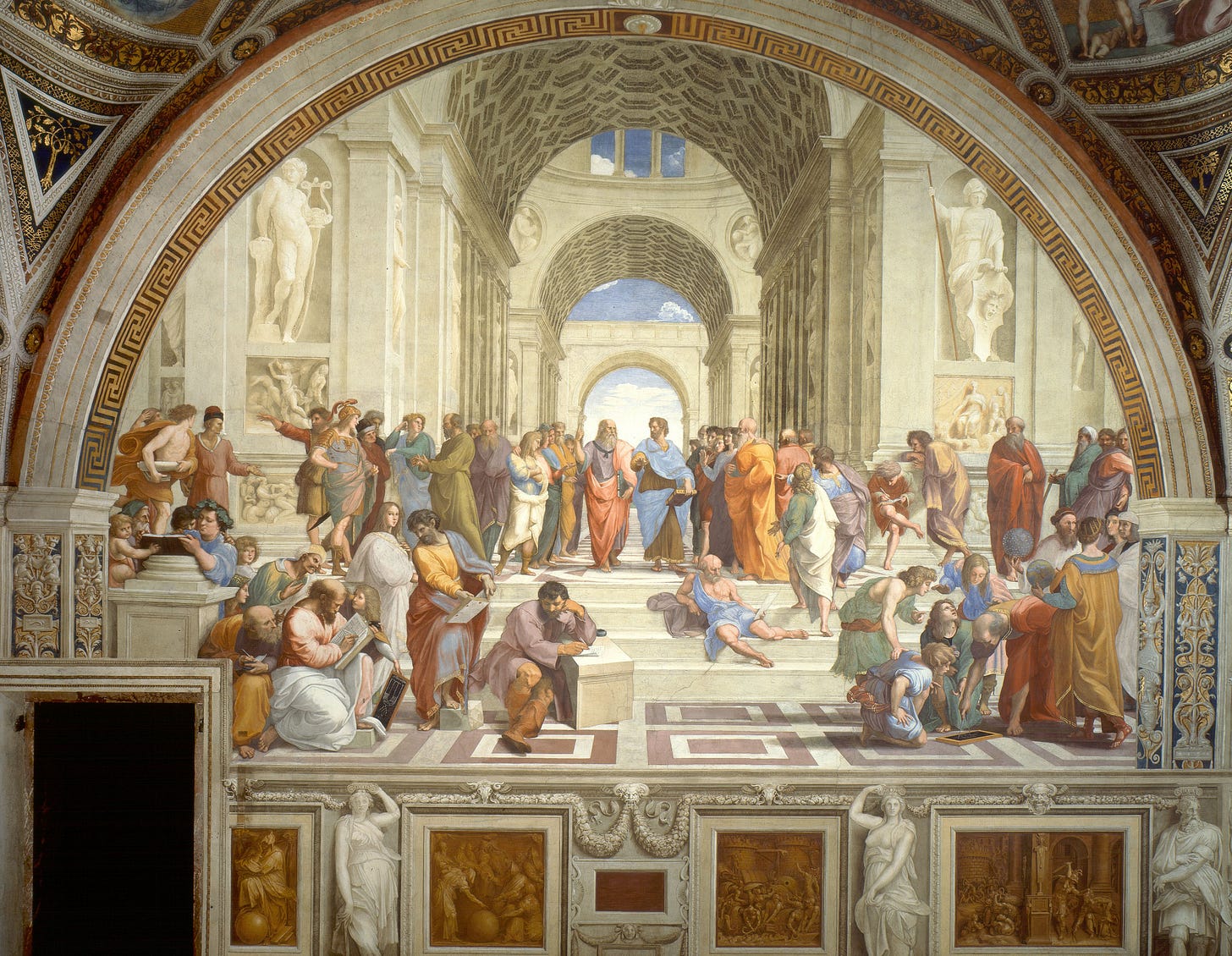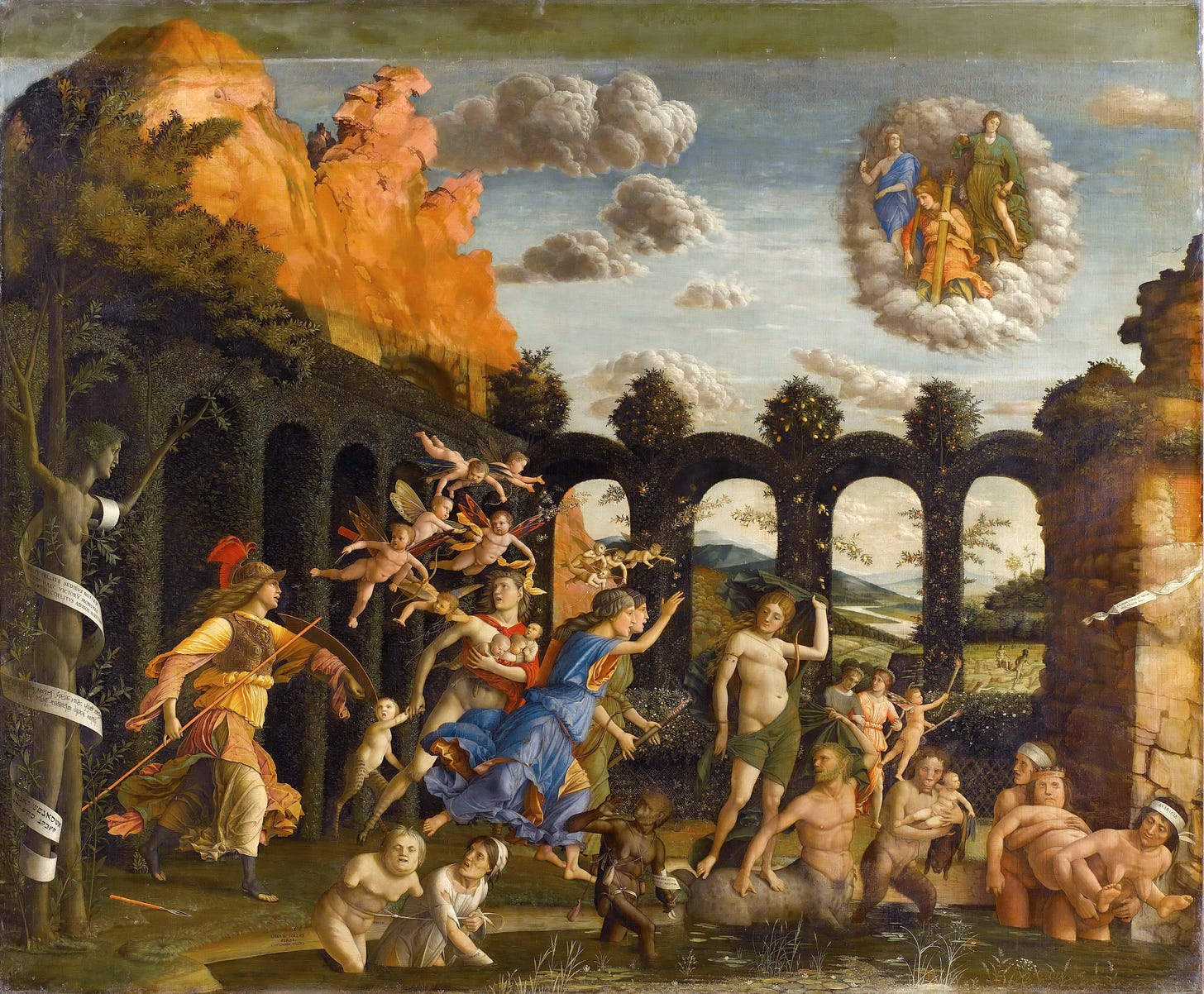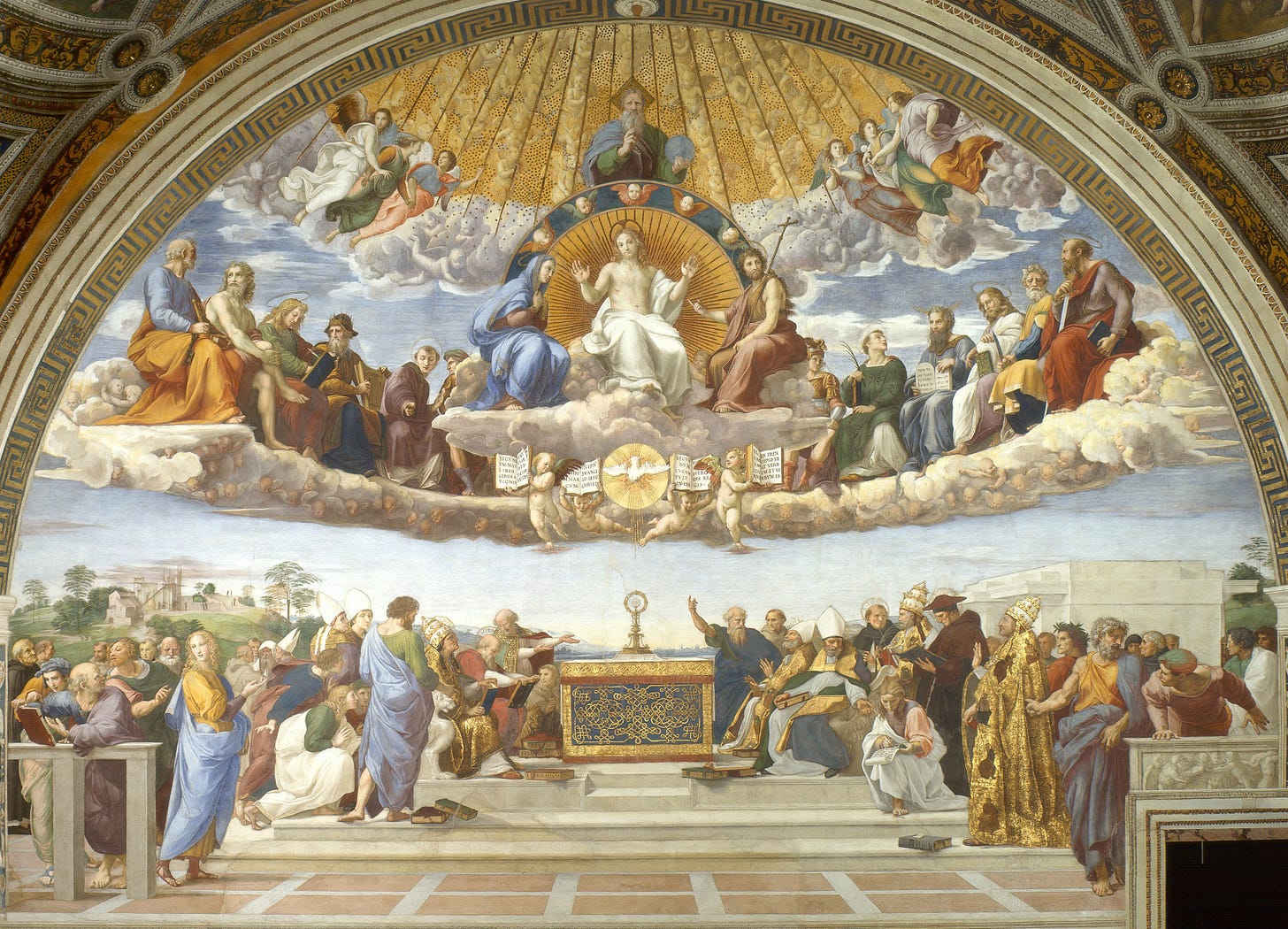Editor’s Note:
This article was originally published on July 12, 2025, through the Restoring Christian Culture Initiative Substack. It is reposted here in its entirety for readers of Ever Ancient, Ever New.
In the previous article on Classical Education: The Hollowing of the Mind, we considered the decline of value in Catholic Education and the slow death of Catholic education in our society and Church in the United States. We discussed how the need for truly Catholic schools to rise again is a necessity. Today, I want to explore a more definite part of the topic at hand: Not only why a Catholic school, but why a classical Catholic school?
Today we ask: how does a Catholic classical education hallow the mind and soul? (Hallow, from the Old English word meaning to make holy.)
In order to begin, we must first identify a problem. Education in the modern world, at least in this country, is failing. Whether Catholic or non-Catholic, classical or modern school, almost everyone can agree that something has gone very wrong in the education system in this country.
As one contributor from the Institute for Faith and Culture pointed out:
“In 2023, Gallup found that nearly two-thirds of Americans (63%) were dissatisfied with our public schools. In fact, parents have been withdrawing from public schools with mounting concerns over academics, safety, and woke indoctrination. In 2012, almost 91% of all K–12 students were enrolled in public schools. One decade later, that number had fallen to 87% — a loss of nearly two million students. In its forecast for 2031, the National Center for Education Statistics expects the loss of another 2.9 million students in public schools.
Meanwhile, enrollment in private schools and charter schools is swelling. That trend will only continue as states remove financial barriers to quality education.”
He later points out in the same article that it is not due to a lack of funding: “Since the year 1960, funding per student has increased 350%, and the U.S. spends more per student than every other nation on Earth besides Luxembourg.”
As this proves—and as most of us from firsthand experience already know—the problem does not lie in money. The United States federal government and state governments have been nonstop throwing money at the school systems since the mid-1960s, and these have continued on the same downward course consistently.
As we’ve seen, the issues plaguing modern education aren’t merely financial. Despite the massive increase in funding, the system has continued to deteriorate, underscoring a critical point: The real problem is not the resources, but what is being taught—and, more importantly, how it is being taught. The modern educational model has lost its way, prioritizing utility over wisdom, conformity over creativity, and ideological uniformity over the search for truth.
This is where the classical model offers a profound alternative. Unlike the modern system, which is often fragmented and shallow, classical education seeks to form the whole person, cultivating not just the intellect but the virtues, character, and soul. It directs the mind not just toward knowledge, but toward wisdom, rooted in truth and tradition.
Today, I want to explore why a classical Catholic education—with its emphasis on timeless values, rigorous intellectual discipline, and a harmonious integration of faith and reason—is the solution we need. It's not simply about imparting facts or preparing students for a career but about shaping them to become virtuous, thoughtful, and faithful individuals who are ready to contribute to society in a meaningful and lasting way. And, most importantly, to get them all to Heaven.
What is the Mind For?
The Philosopher, Rembrandt
What is the purpose of learning and education? This is the first fundamental questions that anyone has to consider when we speak of education. If we cannot produce a somewhat reasonable answer to this questions, then we have no business in education at all.
The modern world primarily sees education as a tool for utility—to get a job, to get into a good college, to become efficient and productive. Things which, in and of themselves, are not bad or evil. They are genuinely good in most circumstances. Why wouldn’t we want our children to get a good job to provide for their families—unless they are called to the priesthood or the religious life? Why wouldn’t we want our children to get into good colleges that will continue their intellectual formation? Why wouldn’t we want more productive and efficient members of society?
Of course, we would want all of those things and more for our children. But the problem is that all of those things are ultimately only a means to an end, not an end in itself.
In the Catholic and classical mind, we must respond by saying that education is not just for function; it is for formation. A good deal of a Catholic education has practical benefits, but that is not the point. And if you believe it is, you are setting up your children for failure. The educational problems of such a position we will address later, but the immediate problem is this: Education must clearly communicate to the pupil the end of themselves, the telos toward which they tend, which is, for each and every human person, the salvation of their souls.
In contrast to the modern utilitarian goals, the higher ideal of Catholic humanism stands out: to become what you are in the eyes of God. To become whatever it is He will, and ultimately to be with Him forever in Heaven, and to live your life on Earth as if you were already there in His presence.
What is Classical Curriculum?
When we speak of classical education, we are speaking of the mode of education that originates in ancient Greece, finds its fulfillment in Christian scholasticism of the medieval age, and still finds its way to us in the 21st century. Classical education is a holistic approach that focuses on the liberal arts and the humanities while stressing the inculcation of virtue to live a good life.
The School of Athens, Raphael
Let’s break down the parts that make up the classical curriculum:
The Trivium: Grammar, Logic, and Rhetoric
Classical education is structured around the trivium, a three-part framework designed to develop a student’s intellectual abilities in stages:
Grammar (the study of language and the foundational facts): This stage focuses on memorization and mastery of the basic elements of language, literature, and history. In the younger years, students focus on learning the building blocks of knowledge—facts, rules, and structures. Latin is introduced, as it lays the groundwork for understanding other languages, logic, and the structure of thought.
Logic (the study of reasoning and argumentation): This stage trains the student in the art of reasoning and critical thinking, teaching them to think clearly, logically, and coherently. Students learn to analyze and critique arguments, distinguish between sound reasoning and fallacious logic, and understand the relationship between premises and conclusions. This includes the study of formal logic using Aristotle.
Rhetoric (the study of effective communication): In this stage, students learn how to express themselves persuasively and eloquently. Rhetoric is not only about speaking well but also about writing clearly and persuasively, and about understanding the deeper purposes of communication—how to influence, inspire, and lead others. This final stage involves integrating the knowledge and reasoning gained in the previous stages into articulate, persuasive expression.
The Quadrivium: Arithmetic, Geometry, Music, and Astronomy
The quadrivium refers to the four classical subjects that form the basis of mathematical and scientific knowledge:
Arithmetic (the study of numbers and their relationships)
Geometry (the study of space and form)
Music (the study of harmony and proportion)
Astronomy (the study of the cosmos and its order)
Together, these subjects reflect a classical belief in the order and harmony of the universe, and students learn to appreciate how all knowledge is interrelated and part of a greater cosmic order.
The Great Books
Central to classical education is the study of the Great Books of Western civilization—works of philosophy, literature, history, theology, and science written by the great minds of the past. This includes authors like Homer, Plato, Aristotle, Augustine, Dante, and Shakespeare. The goal is not just to read these texts but to engage with them critically—asking questions, debating ideas, and discovering timeless truths that transcend the centuries.
In classical education, reading these works is not about preparing for standardized tests or achieving professional qualifications; it is about forming a well-rounded, thoughtful individual who is grounded in the greatest ideas of human thought.
Language
In classical education, there is—as previously stated—a great emphasis placed on the student learning Latin and Greek, as these are the two great languages of Western civilization. At Lumen Christi Academy, we only teach Latin.
The study of Latin, however, takes on a whole new meaning when placed in the light of the Catholic faith, and a faith that is lived daily in a traditional school. The liturgy is in Latin, many of the prayers we say are in Latin, and we teach the students to sing Gregorian chant in Latin. For many students, a priestly or religious vocation is in their future, in which case they are beyond prepared for the Latin studies required for entering a traditional monastery or house of formation.
Character Formation and Virtue
Classical education is not simply about acquiring knowledge; it is about becoming a virtuous person. The classical approach seeks to form the whole person, cultivating not only intellectual virtues (such as clarity, wisdom, and discernment) but also moral virtues (such as courage, temperance, justice, and prudence). These virtues are cultivated through both the study of the great works of literature and philosophy and through lived experience, including ethical discussions and personal reflection.
The Triumph of Virtue, Giulio Romano
The end goal of classical education is not merely to produce good students but to form good people—individuals who understand their role in the world, who know the good, and who are capable of living it out in their lives.
In a traditional Catholic environment, students are also equipped with the theological virtues of Faith, Hope, and Charity. For, in the end, the goal is heavenly virtues, those which allow the soul to live in the very life of God.
A Focus on Inquiry and Wonder
Unlike modern education, which often emphasizes memorization and testing, classical education encourages a love for inquiry and wonder. It emphasizes the importance of asking profound questions about life, meaning, and purpose. Students are encouraged to approach their studies with a sense of awe and reverence, seeing education as a lifelong journey of discovery rather than a mere preparation for a career.
Human Flourishing and the Good Life
Classical education views knowledge as a means to human flourishing. It seeks to shape individuals who are capable of living a life of virtue, guided by wisdom, and oriented toward the good. This vision of education transcends the narrow goal of career preparation and emphasizes the formation of the soul in accordance with eternal truths.
Heaven is the Goal
A truly classical education can never be separated from God. Despite the good intentions and results of charter schools or the like that boast a classical curriculum, the simple truth is that it is all for naught if Christ and His Church are not at the center of the education.
The Disputation of the Holy Sacrament, Raphael
When all men are judged after their death, it will not avail them how well they did in school—even if it were a classical school. Christ, the Supreme Judge, will not question them on the writings of Homer, Dante, or Descartes. He will not quiz them on their Latin declensions, or who won what war in what year. He will simply compare our lives to the Divine Life. We will be measured by how we kept His Commandments and lived according to His Will.
In the end, Christ is all that matters. We should give our kids a good education, a good classical education. But we cannot mistake the means for the ends. A good education is but a means to the end, which is Heaven, life everlasting with God.
Why Lumen Christi Academy?
At Lumen Christi Academy, we are committed to providing an education that aligns with the classical tradition, but more importantly, one that is rooted in the Catholic faith. We believe that a true classical education, when informed by faith, not only shapes the intellect but sanctifies the soul, guiding students toward their highest purpose: eternal union with God.
Our curriculum, built around the trivium and quadrivium, emphasizes intellectual development alongside spiritual and moral formation. Through the study of Latin, logic, and rhetoric, students develop the tools for clear thinking and eloquent expression, while being immersed in the timeless truths of the Catholic faith. The Great Books of Western civilization are studied not as mere intellectual exercises but as guides to a life well-lived, rooted in virtue, truth, and the search for wisdom.
Lumen Christi is not just a place for academic growth, but a community where students learn to live out their faith every day. Our liturgical life, with its Latin Masses and Gregorian Chant, is at the heart of our school’s culture. We don’t just teach religion as a subject, but as a way of life, helping our students understand that their ultimate goal is to live a life that leads to Heaven.
But the classical curriculum at Lumen Christi is more than just an academic framework—it is a vehicle for the formation of the whole person. Through our focus on character formation, our students develop not only intellectual virtues but the theological virtues of Faith, Hope, and Charity, which guide them in their daily lives. We teach our students that true human flourishing is not measured by grades or career success, but by how closely their lives align with the teachings of Christ.
The Path Forward: A Holistic Approach to Education and Faith
As we continue to build Lumen Christi Academy, our mission remains clear: to form virtuous, thoughtful, and faithful individuals who are not only prepared for a successful life on Earth but are prepared to live forever with God in Heaven. This is the true end of education, and the classical Catholic curriculum provides the perfect foundation for this formation.
In the upcoming article, we will explore the daily spiritual regimen at Lumen Christi Academy—how we integrate prayer, the sacraments, and the practices of the Catholic faith into the life of the school. We will also look at how these spiritual practices complement the classical curriculum and contribute to the formation of the whole person.





